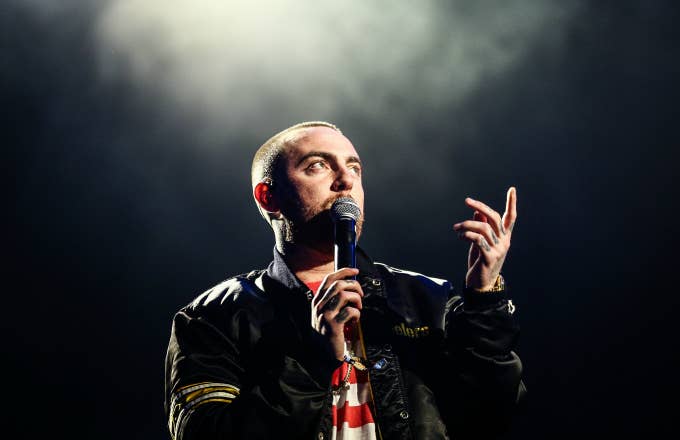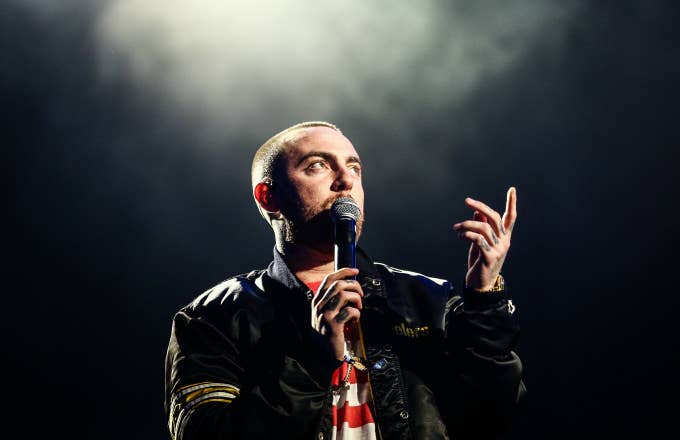
When I met Mac Miller, he was smoking a menthol, squinting into the sun, and grinning like an idiot. It became a routine during our 2016 talk at a Burbank café two years ago nearly to the day he died—as much as anything can in a couple hours. He'd get up mid-sentence, walk out to the parking lot, balance his coffee on a pylon, and burn half a matchbook trying to light up, talking and smiling through the whole dumb ordeal. He was exuberant. Not even a little disgruntled.
"Being able to just have a life and be out in the world... I really enjoy having a day. I like to get home and be tired," he said through a cigarette as if his circadian rhythm was a thing he found on the far side of Mars. "My favorite thing about life right now is that I can go to sleep. I lay my head on the pillow like, 'I did good today.' I used lay down and be like, 'I hate myself.' I'd stay up and watch every single Netflix show, but I haven't even been watching TV. I've been outside."
It's easy to focus on Mac's morbidity if all you have to go on is his art. He's been rapping about his early demise for about as long as he's been famous, and it's impossible to ignore the details of his last proper music video, "Self Care"—him in a coffin, carving "memento mori" into the pine before punching his way out of the earth. But the Mac that I met wasn't some bleak, drug-addled fatalist. He likened his career to that of a farmer and wouldn't shut up about how great trees are.
He was sober then, around the release of The Divine Feminine. For exactly 61 bright-eyed days and heavy-lidded nights, he had, in his words, done good. Sleep was no cousin of death to Mac; it was the engine of life, and a sign that a little hard-won peace had come. He'd just moved from Brooklyn to Los Angeles, an inveterate studio shut-in looking for a fresh start out under the sun. And he was newly in love. With a woman, yes, but moreover with the world. I believed all of it.
I didn't even notice the part where he told me, "My mind is a crazy place and being fucked up all the time is way easier than embracing myself." It just seemed irrelevant. With Divine Feminine, Mac broke free of loops. He was no longer a rapper tied to a rhythm. He was singing in sessions with musicians and transforming into something—someone—new. "Every album I've ever made has ended in death besides this one. This is the first that has a happy ending," he'd said with pride.
Even though it'd been there before, I couldn't see the loop coming back around. After the news of his passing broke, I revisited a phone interview I'd had with Mac a year before our meet-up, for 2015's GO:OD AM. My heart sank. Back then, Brooklyn was his fresh start. He went there to escape L.A. and his home-turned-studio-squat. And that was after getting clean at Rick Rubin's house. "It was all a lie," Mac later told me in Burbank. I laughed it off as a joke, but maybe not?
The thing is, if we've learned anything of use in the wake of this, it's that the Mac I saw was no mirage. Tribute after tribute from folks who actually knew him affirms that whether on the wagon or off, single or spoken for, he left everyone feeling like I did: floored by his generosity of spirit, inspired by his zeal for betterment, believing he'll win in the end. Our collective shock is justified. That someone so vibrant in life could be careening toward death at 26 seems unconscionable.
Swimming continued down that unbound musical path, but not the philosophical one. Lyrically, he's back in his head. Back inside. Gone are the trees and sunlight, replaced by recurring lines about brackish waters and thick clouds. There's hope and humor, but it's tinted darkly. Mac's last profilesportray a man recently secluded, anxious in crowds, and rattled by paparazzi. He talks a lot about how little he cares what strangers think of him, which could mean he cares quite a bit.
His final album is also the rule that proves Divine's exception. It does end in death, with a song that shares its name with Kurt Vonnegut's stoic catchphrase about quietus: "So It Goes." Over a woozy beat that ends in a funereal swell, Mac rhymes, "Nine lives, never die, fuck a heaven, I'm still gettin' high." And later: "No relaxing, kicking back, this ain't exactly in the plan/I can't get no satisfaction, goddamn/.../My god, it go on and on/Just like a circle, I go back where I'm from."
And yeah, that track was the last thing he shared, in an Instagram story the night before he left, so now I'm in the lyrics looking for a sign not of the peace that Mac sought, but of the doom that found him. But I still refuse to believe in the loop. The Mac who goes out on an apparent overdose, that's their Mac—the one that gossip-mongers assumed he'd be. But our Mac was neither a foregone conclusion nor a closed circle. He was open, and bigger than any vessel that would contain him.
"Am I trying to be a positive force in the universe or am I just sitting in my own shit, surrounding myself with it?" Mac asked back in 2016. I must've followed him out to that pylon six times as he subsumed a pack of smokes and 16 shots of espresso. His body stayed on this crude circuit but his mind traveled to loftier climes. "Fuck that. Love is amazing. I've seen human beings on every single drug and love takes the cake. Love is some seriously powerful shit. And I'm a lover, man."


